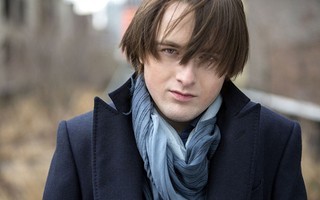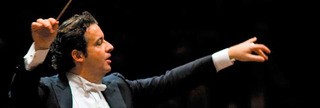|
Back
A 19th Century Troika New York
Avery Fisher Hall, Lincoln Center
12/30/2014 - & January 2*, 3, 6, 2015
Nicolai Rimsky-Korsakov: Capriccio Espagnol, Opus 34
Sergei Rachmaninoff: Piano Concerto No. 1 in F-sharp minor, Opus 1
Peter Ilych Tchaikovsky: Symphony No. 6 in B minor (Pathétique), Opus 74
Daniil Trifonov (Piano)
New York Philharmonic Orchestra, Juanjo Mena (Conductor)

D. Trifonov (© Dario Acosta)
Note to New York Philharmonic Department of Marketing: If you want to fill up Avery Fisher Hall, running the gamut from the orchestra seats to the highest balconies, make certain to schedule Peter Tchaikovsky. Lots and lots of Tchaikovsky. If necessary, include some Rimsky-Korsakov as a filler.
Note to New York Philharmonic Department of Miracles: Two words. Daniil Trifonov.
Yes, the Phil was sold out last night, and doubtless quite a few came for the 23-year-old Russian miracle-maker. But the vast numbers came to hear a piece they could hum by heart, the Pathétique. And why not? Peter Ilych is still a remarkable composer. Even Pierre Boulez gives him an ironic compliment, noting that “those who applaud Tchaikovsky applaud themselves for their ‘good taste’. And those who want to hear Tchaikovsky over and over again pride themselves on good taste.”
So when BBC conductor Juanjo Mena gave a pleasingly tense austere performance of the Sixth, he wound up the soloists of New York Philharmonic and (as Boulez would say), he wound up the sartorially, emotionally avatars of excellent taste who packed Avery Fisher Hall last night.
But, like coming to a dinner party expecting beefsteak and Beaujolais, but presented with vessels of Beluga and carafes of Champagne, the audience realized long before the second-half Symphony, that they were in touch with greatness, if not a sheer miracle.
Daniil Trifonov showed, at his recital last month, the image of a supposed Golden Age of virtuosity: the era of Godovsky and Horowitz, albeit with the sensuousness and delicate balance of his own times. With the Rachmaninoff First Concerto, composed in 1893, a period when Russian virtuoso music in violin and piano was at its apex, Mr. Trifonov found himself in the most luscious setting for his greatness.
And yes, greatness can come at the age of 23. (Mozart was already in late middle age!). On the surface, one noted the astounding finger work, from the very first measures, digits which literally flew around the keyboard, with what seemed like winged ease.
Yet that was only the surface materials on a luxurious tapestry. Amidst those octaves, Mr. Trifonov threaded the theme around the orchestra itself. This was not simply virtuosity, it was a pliability, taking the piano in and around the Philharmonic. Conductor Juanjo Mena kept the ensemble in line, but there was little doubt that Mr. Trifonov was the ruler here, varying the rhythm and the sound. What began as a bright exercise went into darker streams until his remarkable cadenza, where the theme of the Vivace arose so brightly from the piano.
One might imagine that Mr. Trifonov might be using the Andante like a racing-car pit-stop, just to get his breath back, but no, that lovely Rachmaninoff theme was given full import here. And that was before the strangely short Allegro vivace. Two “vivace” movements in one concerto was, yes, a vessel of caviar for this amazing man. And even better is that later this month, he and the great Gidon Kremer will be giving a recital together.
Ah, is this not paradise enow?
Mr. Trifonov is hardly averse to giving encores, both classical and jazz, and here he played a Debussy Image, with an Iberian lilt, breathing the amorphous chords into those great scales at the end.
No Debussy was in his recital, but oh, how I wished he included all three sections of the Images.

J. Mena (© Columbia Artists Management)
The evening of Russian music started with Mr. Mena conducting Rimsky-Korsakov’s Capriccio Espagnol, a work, paradoxically is rarely played here because of its popularity. Perhaps since Rimsky was such a glistening orchestrator, one forgets that his melodies, his rhythms, his textures were far more sophisticated that his colleagues. The “Glorious Five” were wonderful, but works like the Capriccio can stand the test of time.
Mr. Mena started almost hesitantly, but once he got to the Gypsy Song, there was no stopping him–or his soloists. Concertmaster Sheryl Staples played some beautiful solos here, but in runs as dazzling as those of Mr. Trifonov, flutist Robert Langevin and clarinetist Anthony McGill were did their roles, all held together by the fine percussion ensemble.
Mr. Mena gave them each individual credit, but he deserved the plaudits for starting with such verve and such Russian-Spanish vivacity.
Harry Rolnick
|